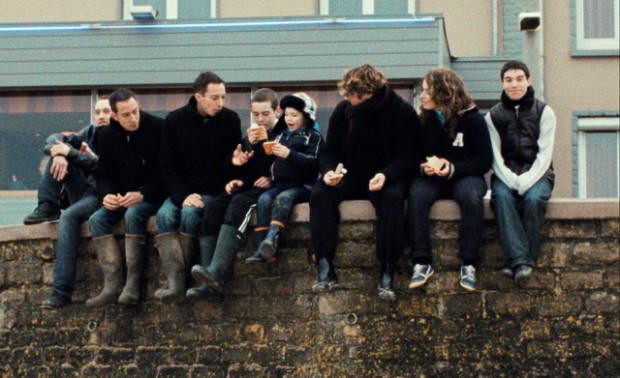Gilles Deroo and Marianne Pistone have crafted a formidable feature-length debut with Mouton. Young Aurélien Bouvier (David Merabet) is granted independence from his mother after a vicious custody hearing. To the locals of the seaside town he now resides in, Aurélien is known as ‘Mouton’ or ‘Sheep.’
Mouton’s life unfolds in placid vignettes highlighting his prep work at a restaurant and frequent make-out sessions with the new waitress on staff. There is an innocence and uncommunicative side to Mouton, however, that makes his nickname a particularly apt one. His friends, an ensemble of young Courseulles-sur-Mer residents that patrol the rainy beaches, hold Mouton down and take turns spitting in his face. Mouton offers little resistance and the white kitchen outfit he sports through much of the film further distinguishes his sheepish qualities.

The first half of Mouton is reminiscent in tone and execution of the work of another filmmaker duo concerned with youth’s latent dramas, the Dardennes. Deroo and Pistone, like the Dardennes, adopt a camera in motion and childhood melancholia but only as a starting point for their wild vision. Celebrations for the Feast of St. Anne mark the halfway point of the film and Mouton’s departure from any perceived narrative arc. On the jetty that long loomed in the background of his life, Mouton finds himself surrounded by a festive and promiscuous community in celebration. Rather than embarking on a happier existence, Mouton is the victim of a violent and senseless attack. The moment plays out in a haunting static shot.
The remaining film follows Mouton’s various friends and their continued lives around the seaside. The film’s meandering second half examines the remnants of normalcy in the distant wake of an act of senseless violence. Mouton’s friends Louise, Mimmi, and Benji trudge between grueling jobs at animal shelters to encounters with prostitutes in parking lots. If none of it directly recalls their sidelined and ill-treated friend or the first half of the film, these seemingly aimless passages of life directly appeal to the idle frustrations experienced by those outcasted from society. Title cards, narration, and chapter headings signal the brazen departure from the start of the film but are relatively useless as signposts to guide us through a film in intentional disarray.
Mouton is a film eager to diverge from direct instances of cause and effect. Its structure is radical and frustrating. What makes the film so striking is the sense that the filmmakers share these frustrations. A camera searches the coastline for something – a narrative, a character, even an image that could fortify a basic understanding of the text set forth. Its inability to locate one such thing makes Mouton an unusually potent experiment. Deroo and Pistone end the film on a postcard image of the scenic location that housed their characters and unresolved tales. I’m eager to see where they venture to next.
Mounton screens on March 20th and March 22nd at New Directors/New Films. Watch the trailer above.

